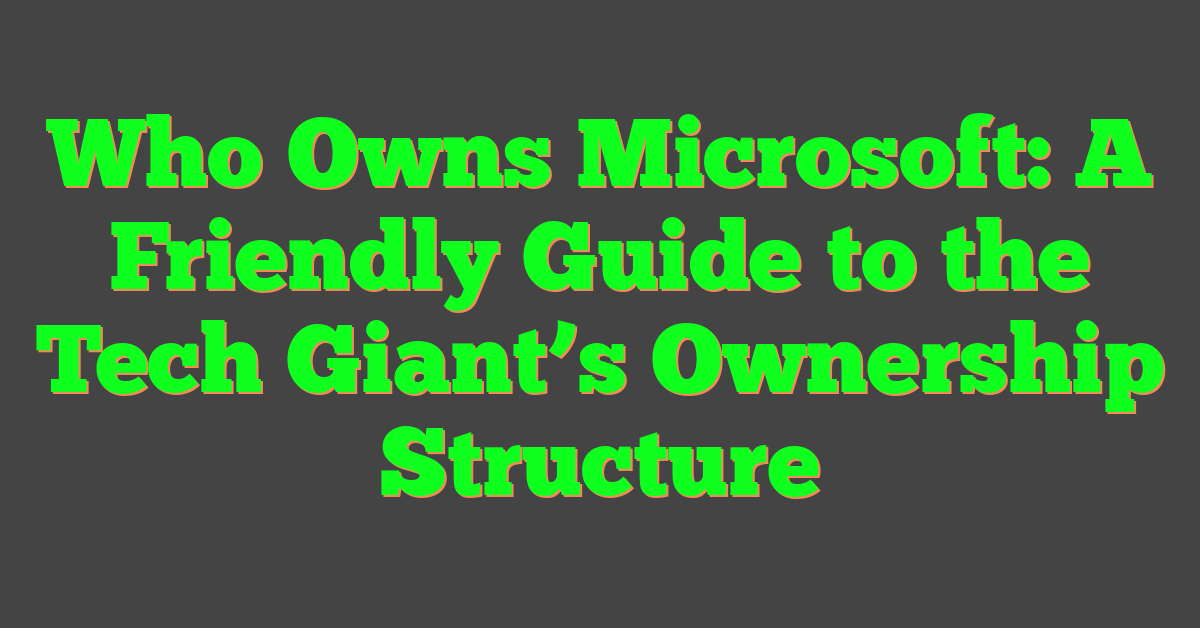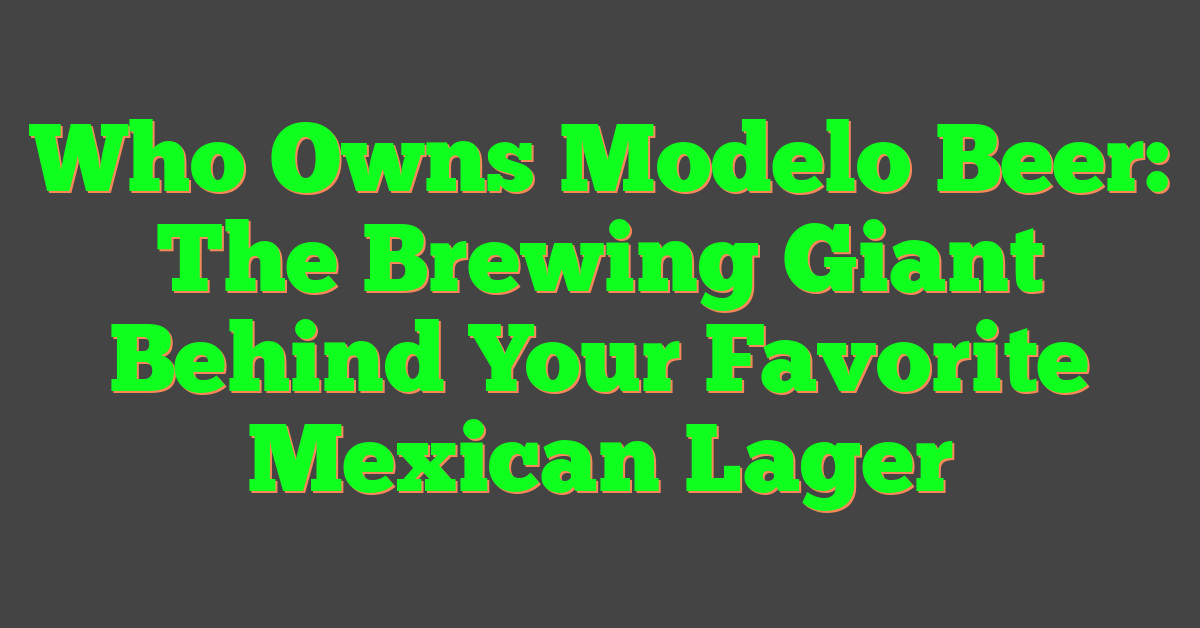Wondering who’s behind your cold can of Coors? Many beer drinkers are curious about the ownership of their favorite brews.
Coors beer is owned by the Molson Coors Beverage Company. This company was formed in 2005 when Molson of Canada merged with Coors of the United States.

The company has deep historical roots going back many years. Coors was originally established as a family business, but today it’s part of a much larger corporate structure.
The Molson Coors merger created one of the largest brewing companies in the world. This expanded its reach while maintaining the distinctive qualities that made Coors popular.
Despite being part of a big corporation, Coors maintains its identity among its wide range of brands. Unlike some beer companies that get purchased by completely unrelated businesses, Coors has remained within the brewing industry throughout its history, with the company staying self-owned even as it evolved.
Key Takeaways
- Molson Coors Beverage Company owns Coors beer following a merger between Molson and Coors in 2005.
- The company operates globally while maintaining the distinct identity of its various beer brands.
- Despite corporate growth, Coors has remained connected to its brewing heritage rather than being sold to outside industries.
Ownership and Corporate Structure
Coors is now part of a larger company called Molson Coors Beverage Company. This company was formed back in 2005 when Coors merged with Molson, a Canadian brewing company.
Before the merger, Coors was known as the Adolph Coors Company. When they joined forces with Molson, they created a new holding company that owned both breweries.
Institutional investors own a significant portion of Molson Coors. These large investors control about 76% of the company’s shares. This means most of the company is owned by investment funds and financial institutions rather than individuals.
One notable institutional owner is Charles Schwab Investment Management, which holds over 1.6 million shares in the company.
The Molson family continues to play an important role in the company. For example, a member of the Molson family has been a general partner of CH Group Limited Partnership and serves as its president and CEO since 2011.
The company is publicly traded on the New York Stock Exchange under the ticker symbol TAP. This allows anyone to buy shares and become a partial owner of the company that makes Coors beer.
History of Coors
Coors Brewing Company has roots dating back to the 19th century. It all began when Adolph Coors came to America in 1868. Within just five years of his arrival, he founded the Golden Brewery.
In 1873, a German brewer’s apprentice who had little money started what would become an American brewing legend. The Coors Brewing Company was established in Golden, Colorado, and has since grown to become the largest single-site brewery in the world.
The brewery has weathered many challenges throughout its history. One of the biggest hurdles was Prohibition, which forced many breweries to close. Coors, however, managed to survive this difficult period and even helped lead Colorado out of Prohibition.
The company remained independent for many decades before major changes occurred in the 2000s. In 2005, Coors underwent a significant transformation when it merged with Molson of Canada to form Molson Coors.
The company expanded further in 2016 when Molson Coors acquired Miller Brewing Company. This acquisition further cemented its position as one of the world’s largest brewing companies.
In 2023, Coors celebrated its 150th anniversary – an impressive milestone that few American companies have reached.
Molson Coors Beverage Company Overview

Molson Coors Beverage Company stands as a major player in the global beer industry with operations spanning North America and Europe. The company formed through strategic mergers that combined centuries of brewing heritage with modern business practices.
Company Milestones
Molson Coors was created in 2005 through the merger of Molson of Canada and Coors of the United States. This union brought together two historic brewing families under one corporate umbrella.
The company continued to grow through strategic acquisitions. In 2002, before the merger, Coors acquired the England and Wales-based business of Bass Brewers and established Coors Brewers Ltd., which became the UK’s second-largest brewer at that time.
A significant expansion occurred in 2016 when Molson Coors acquired Miller Brewing Company, further strengthening its market position and brand portfolio.
Today, Molson Coors operates through two main divisions: Molson Coors North America and Molson Coors Europe. The company is publicly traded, making it owned by its shareholders rather than a single individual or family.
Key Figures and Leadership
Molson Coors is governed by a board of directors and executive leadership team who guide the company’s strategy and operations. The ownership structure includes major institutional investors that hold significant stakes in the company.
According to recent data, the largest shareholders include:
- Vanguard Fiduciary Trust Co. (11.11% with 21,498,302 shares)
- Dodge & Cox (7.528% with 14,571,189 shares)
- BlackRock Advisors LLC (5.823%)
The company maintains 933 shareholders holding approximately 171,759,643 shares in total. While descendants of the Molson and Coors families still maintain involvement, the company is now primarily owned by institutional investors and public shareholders.
Coors’ Product Line
The Molson Coors Beverage Company has evolved far beyond its famous beer offerings. Their portfolio now spans premium brews, trendy hard seltzers, and innovative non-alcoholic options to meet changing consumer preferences.
Premium Brands
Coors’ premium lineup features several well-known favorites that beer enthusiasts recognize worldwide. The company’s brand portfolio includes classics like Coors Banquet and Coors Light, which remain cornerstone products.
They also offer Blue Moon, a craft-style wheat beer that’s gained popularity for its orange slice garnish and smooth taste. Miller brands became part of the collection when Molson Coors acquired full ownership of the Miller brand portfolio in 2016.
Other premium offerings include:
- Carling – Popular in the UK market
- Staropramen – Czech pilsner with European appeal
- Leinenkugel’s – Craft-style beers with seasonal varieties
Availability varies by country, as product distribution differs across regions.
Hard Seltzer Expansion
Responding to market trends, Molson Coors jumped into the hard seltzer category with enthusiasm. Their Vizzy Hard Seltzer line features fruit-forward flavors with added vitamin C, targeting health-conscious consumers.
Topo Chico Hard Seltzer, produced through partnership with Coca-Cola, brings a popular mineral water brand into the alcoholic beverage space. This collaboration highlights the company’s strategy to leverage existing brand recognition.
Coors Seltzer rounds out their offerings in this category, using the familiar Coors name to attract traditional beer drinkers curious about seltzers. These products typically contain:
Key Hard Seltzer Features:
- Lower calories than beer
- Gluten-free options
- Fruit-infused flavors
- Around 4-5% alcohol content
Non-Alcoholic Beverages Rise
Molson Coors has recognized the growing importance of non-alcoholic options in today’s market. Their modern portfolio expands beyond beer with several alcohol-free alternatives that appeal to health-conscious consumers.
ZOA Energy represents their entry into the energy drink space, offering a healthier alternative to traditional energy beverages. This product line demonstrates how Molson Coors is diversifying beyond its alcoholic roots.
They’ve also developed non-alcoholic versions of popular beers, meeting the needs of those who enjoy beer flavor without alcohol. Coors Edge provides that familiar taste while remaining alcohol-free.
Other non-alcoholic offerings include:
- Ready-to-drink coffee
- Flavored sparkling waters
- Wellness-focused beverages
This expansion shows how the company adapts to changing consumer preferences while maintaining its beverage industry leadership.
Financial Performance and Stock Information

Molson Coors has demonstrated solid financial results in recent quarters, with 2024 marking their third consecutive year of bottom-line growth. The company’s stock has shown interesting movements relative to the broader market.
Stock Performance Analysis
Molson Coors stock (ticker: TAP) has been performing exceptionally well lately. Over the past month, TAP shares have gained 19.1%, outpacing the broader industry’s 15.9% return. This upward trend suggests growing investor confidence in the company’s direction.
The company’s financial foundation appears solid with total equity of $13,284.2 million. This includes $13,092.4 million in stockholder equity and $191.8 million in noncontrolling interests.
Investors can easily track TAP’s performance through financial platforms like Yahoo Finance, which provides real-time quotes, historical data, and news updates that might affect the stock price.
Investment Opportunities
Many analysts consider Molson Coors to be potentially undervalued in the retail stock sector. This creates an interesting opportunity for value investors. They are looking for established companies trading below their intrinsic worth.
The company’s recent financial reports show consistent progress on strategic priorities and strong cash generation. These factors typically appeal to long-term investors seeking stable returns.
Dividend-focused investors might also find TAP attractive. The company has maintained dividend payments. This offers a potential income stream alongside capital appreciation possibilities.
For those interested in beverage industry exposure, Molson Coors represents a more established alternative to higher-growth but more volatile craft brewery investments.
Sustainability and Social Responsibility

Molson Coors, the parent company of Coors, is committed to creating a positive impact on communities and the environment. They call this initiative “Our Imprint for a Better Tomorrow,” which guides their sustainability efforts.
Environmental progress is a key focus for the company. Since 2016, Coors Light has reduced its carbon footprint in the US by nearly 30%, saving more than 1.6 million metric tons of CO2e. They’ve also worked to reduce water usage in their brewing process.
Wherever Molson Coors operates, they aim to leave a positive imprint on communities, consumers, employees, and the environment. Their comprehensive approach addresses various aspects of sustainability.
The company has also set diversity goals for its workforce. By 2023, Molson Coors aimed to increase the number of people of color in its workforce by 25% and improve representation of women across the company.
Recently, Molson Coors has made changes to its diversity, equity and inclusion (DEI) policies. The company revised its approach and announced it would tie executive incentives more directly to business performance.
Their sustainability reporting is transparent and regularly updated. This allows consumers and stakeholders to track their progress on environmental and social commitments.
Future Outlook

Molson Coors Beverage Company is positioning itself for strong growth in the coming years. The company has guided towards high single-digit EPS growth for fiscal year 2025. This exceeds market expectations of low single-digit growth.
The company is celebrating its third consecutive year of bottom-line growth while continuing to advance its strategic priorities. They’ve also delivered strong cash results through 2024. This builds a solid foundation for future expansion.
Molson Coors has invested heavily in modernization efforts to improve efficiency. The company recently unveiled its modernized Golden brewery in a multi-million-dollar project. This project replaced everything between the brew house and packaging line in America’s largest brewery.
Diversification remains a key strategy for future growth. The company continues to expand its portfolio beyond traditional beers into hard seltzers and non-alcoholic beverages to meet changing consumer preferences.
Market analysts view Molson Coors favorably. The company has become a favorite among investors due to its consistent performance and strategic direction.
Competition in the beverage industry remains fierce. However, Molson Coors’ leadership appears confident in their ability to navigate challenges. They also aim to capitalize on emerging opportunities in premium and alternative beverage categories.




